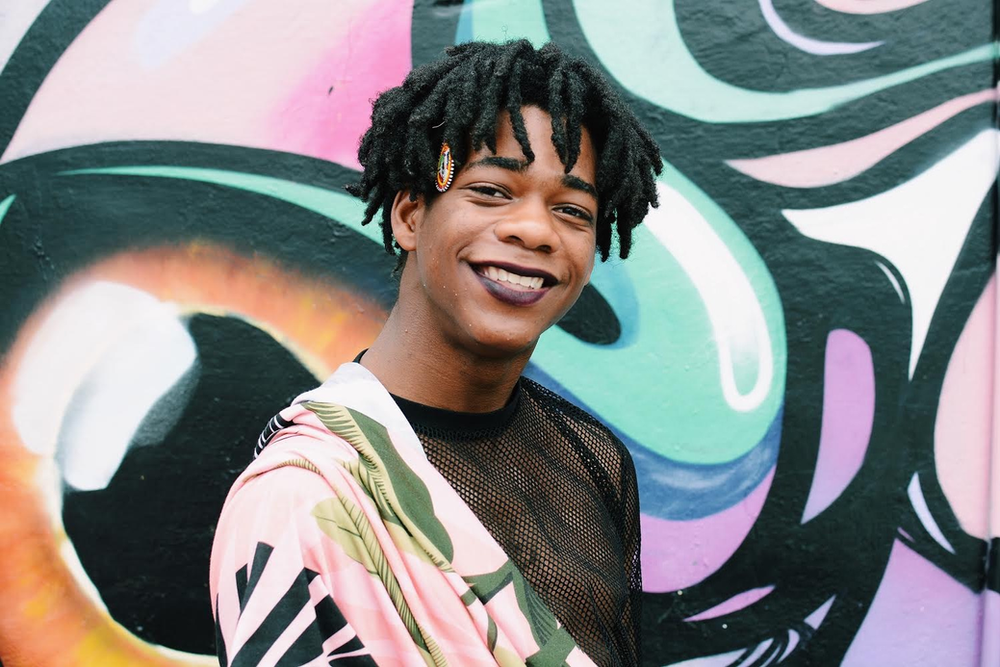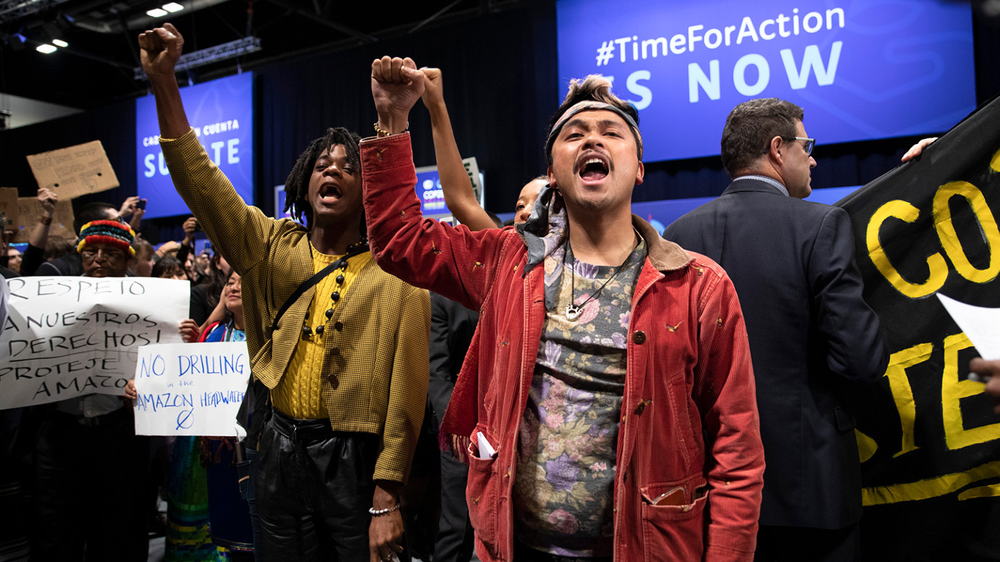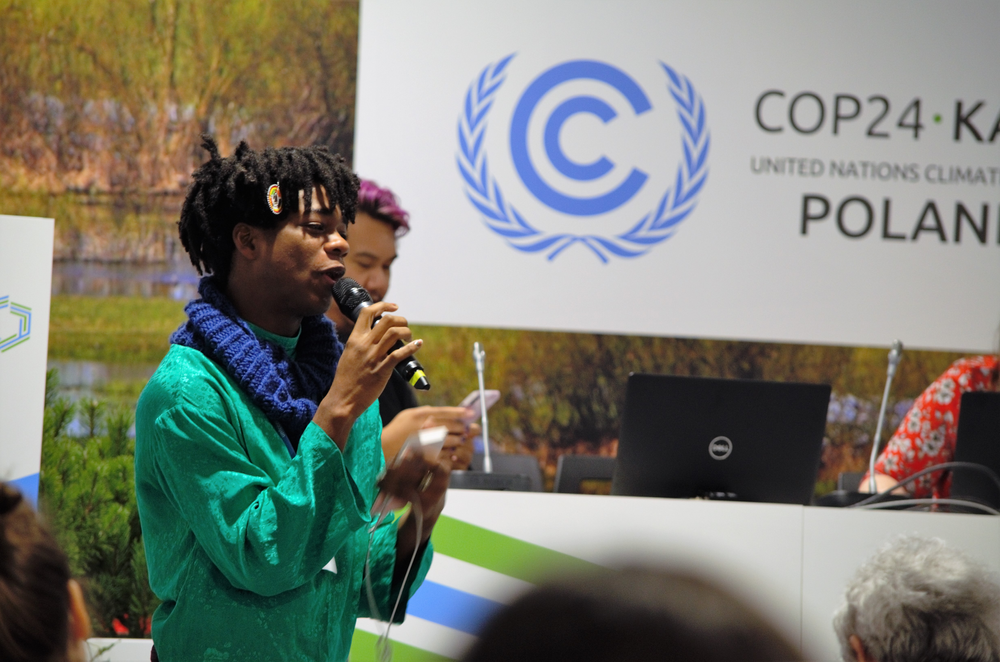Adwoa Addae was sitting on a couch in their home in Jamaica in 2015 feeling energized by the first international agreement on climate policy and action being passed (the Paris Climate Accords) .They were on the brink of graduating from high school and didn’t know what the next couple of years had in store for them. Little did they know that in a few short years their passion for Climate Justice would lead them to be one of the first youth fellows of the Sunrise Organization, meeting Congresswoman Alexandria Ocasio-Cortez, and going to the 2018 UN Climate Talks. Adwoa Addae is a transgender climate justice and racial justice advocate who has worked with a multitude of organizations focused on advocating for a transformed and renewed economy that centers care for Black, Brown and Indigenous communities, written several articles about these topics, been featured by organizations such as Teen Vogue, and gives workshops on understanding the link not only between race and climate change but also how this impacts the LGBTQ+ community.

Adwoa’s story is a story of self-discovery and using their voice to advocate for their community. I sat down with Adwoa via zoom to find out more about their journey. My first question to Adwoa was how they believed race & climate justice was connected. Adwoa explained that in order to understand how racial injustice and climate crisis is connected, we must first understand the root cause. Adwoa believes that we have to look at how the economy that created climate change started. “We’re looking at the enslavement of Black people, and the displacement of Indigenous people. We have this inquest of industrialization and rapid expansion of the west. So we’re thinking about European colonial powers claiming dominion and ownership over the natural world to industrialize, and essentially build cities.” What comes from this Adwoa pointed out, is the development of man-made cities and other built-up environments that we’ve come to accept as necessary to move forward industrial advancement ultimately leading to dependence on fossil fuels and carbon pollution from factories, cars, electricity power plants etc. The clearest distinction that Adwoa can see is that “Black & Indigenous people have been forced to perform labor, have been actively plundered in efforts to support the economies of countries that perceive their humanity/existence as lacking a kind of value.”
Adwoa stressed how in our current economic system there is importance put on the final product. While the raw material is needed to create the final product, it’s not seen as important until it becomes the final product. This desensitization to this means that the raw material and process leading to the final product are seen as less valuable which spills over into how the people that work in the process are treated. This creates a complex economic system that is linked with race. Thus, Black, Brown, and Indigenous people, who they mentioned are forced to perform the extractive underpaid labor that goes unseen, are also perceived to be ‘raw material’ needed to produce goods and services that are then consumed in visible, mainstream Western markets. Adwoa further explained that this in turn means that the needs and luxuries of white communities come at the expense of the livelihood/survival of POC. Adwoa believes that change will only come when the economy moves away from extraction and exploitation.

Adwoa with fellow protestors at the UN Climate Change Confrence in Madrid
It is important to consider how these racist economic, social, and political structures inform the condition of the environment BIPOC communities are confined to live within, and the subsequent treatment they receive during climate and environmental crises. Adwoa spoke on how a lot of BIPOC communities have become ‘sacrifice zones’. Sacrifice zones are essentially neighborhoods/areas that are seen as disposable and as such hazardous waste sites and refineries. On top of the proximity to harmful waste sites and refineries, these communities do not get enough backing and support. Adwoa explains how these communities are “often neglected, pushed aside, or denied adequate resources in times of environment and climate distress, as was seen with the treatment of Puerto Rico after Hurricane Maria.” These communities lack visibility and are cut off from support which shows the number of ways communities of color are impacted by climate change.
My next question for Adwoa was what moments stood out to them from their work. Adwoa spoke how in 2018, they were working with the Sunrise Movement in Florida to advocate for amendment 4. Sunrise Movement is a national organization made up of young people that would specifically work to transform electoral politics and make climate change the top priority in the American political psyche.
Though Sunrise’s main goal was to elect political candidates known to be champions for just and equitable climate policies in the 2018 midterm elections, Adwoa shared that the group partnered with many local organizations across the state to support the passing of the Amendment 4, which was another campaign to reclaim the voting rights of convicted felons who had their voting rights revoked. As part of their work Adwoa and other volunteers went knocking on doors in the community to advocate for the Amendment, and it was a special time for Adwoa because of the people they ran into. They met people who had been formerly incarcerated and would see how they would become overwhelmed with emotion to know that people were advocating for their rights. It was both joyous and heartbreaking because it was beautiful to see their joy and relief, but also heartbreaking because they saw how much work is needed in the community.
Another stand-out memory for Adwoa was also in 2018. The Sunrise Movement picked a group of young people from 5 key swing states to send to Washington D.C. right after the midterm elections. The purpose of sending the group was so that they could start to build a foundation for youth to be a major voting block in the 2020 elections. Adwoa was amongst the chosen youth to go to D.C., where Sunrise Movement and Congresswoman Alexandria Ocasio-Cortez planned to sit in Nancy Pelosi’s office and demand that the Democratic house pass a resolution that Congress looks into a policy to diverge from fossil fuels. Adwoa remembers this time clearly because of the fervor and energy that was in the air. They not only participated in the sit ins, but they also met Congresswoman Alexandria Ocasio-Cortez and delivered a speech on Capitol Hill about Trans & Queer rights. Less than two weeks from this momentous time Adwoa flew to Poland for the UN climate talks. The experience of the Climate Talks while energizing was also disappointing for Adwoa, who was surprised to find that the climate talks were being sponsored by the very corporations that were contributing to climate change. One such event was the U.S. Innovative Technologies Spur Economic Dynamism, which essentially was an event backed by pro-fossil fuel and fracking entities. Adwoa and other protestors interrupted the event, holding signs, and chanting ‘keep it in the ground’.
It fed their spirit to be around kindred souls, but at the same time, they found it disheartening that the changes they had hoped to see were not happening. They spoke about how it was a great feeling to be around grassroots organizers from around the world, who were all passionate and dedicated to their work. Adwoa also spoke about the importance of advocating for trans and queer rights in the discussion about climate change. Adwoa spoke about how Trans and Queer folk are extremely vulnerable to climate change because of displacement resulting from societal persecution and discrimination. Thus when climate disasters strike, Trans and Queer folk are disproportionately impacted as those vulnerable within the community often lack stable shelter and don’t receive support from social and emergency recovery services and efforts.

Our interview concluded there but it was a great experience to learn the inner workings of being a grassroots organizer and learning more about how race and climate justice are connected. It was also a great experience because of the real joy, love, and dedication that Adwoa has for their work, and the energy they brought to the interview.
Powered by WPeMatico


